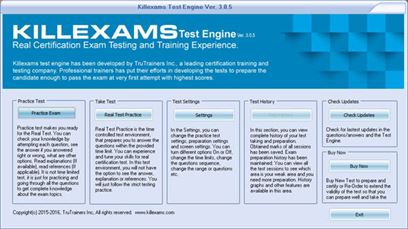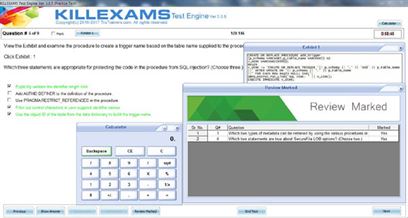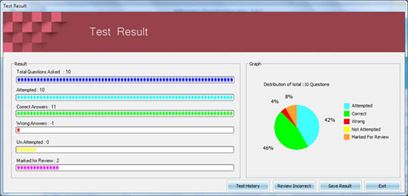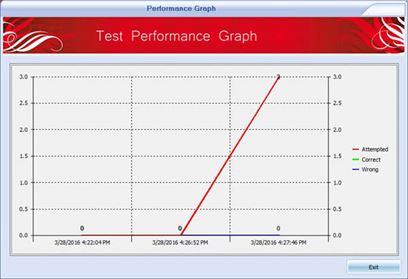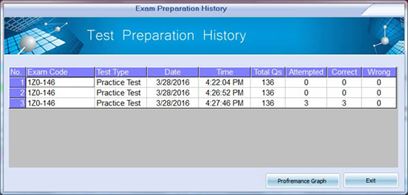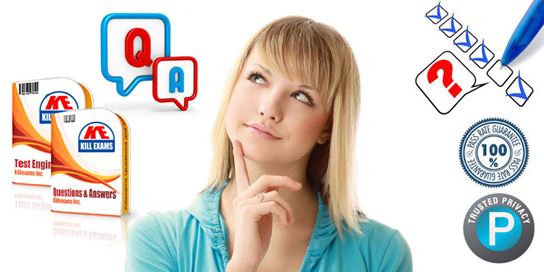Examination for Professional Practice of Psychology Exam Braindumps
Killexams.com EPPP Exam Braindumps contain complete question pool, updated in April 2024 including VCE exam simulator that will help you get high marks in the exam. All these EPPP exam questions are verified by killexams certified professionals and backed by 100% money back guarantee.
EPPP mock test - Examination for Professional Practice of Psychology Updated: 2024 | ||||||||
| Don't Miss these EPPP EPPP Dumps | ||||||||
 |
||||||||
|
||||||||
|
Exam Code: EPPP Examination for Professional Practice of Psychology mock test January 2024 by Killexams.com team | ||||||||
EPPP Examination for Professional Practice of Psychology The Examination for Professional Practice in Psychology (EPPP) is developed and owned by the Association of State and Provincial Psychology Boards (ASPPB). The EPPP is provided to state and provincial boards of psychology to assist them in their evaluation of the qualifications of applicants for licensure and certification. This standardized knowledge-based examination is constructed by ASPPB with the assistance of its test vendor, Pearson VUE. The EPPP is continuously administered in a computerized delivery format through the Pearson VUE network of computer testing centers. State and provincial psychology boards acting collectively through ASPPB provide support for the testing format. Pearson VUE maintains a network of more than 275 Pearson Professional Centers (PPCs) in the United States and Canada in order to provide access to computer-based testing (CBT) for candidates. The resources of individual psychologists, ASPPB and its test vendor are used in the ongoing development of and improvements to the EPPP. These combined resources are greater than those available to any individual psychology licensing. The EPPP is only one part of the evaluation procedures used by state and provincial boards to determine candidates readiness to practice the profession of psychology. Most boards supplement the EPPP with other requirements and/or assessment procedures. The EPPP is intended to evaluate the knowledge that the most exact practice analysis has determined as foundational to the competent practice of psychology. Most candidates taking the EPPP have obtained a doctoral degree in psychology, a year of predoctoral supervised experience and appropriate postdoctoral experience. Candidates are expected to have acquired a broad basic knowledge of psychology, regardless of individual areas of concentration. This knowledge, and the candidates ability to apply it, are assessed through the candidates responses to objective, multiple-choice questions that are representative of the field at large. The average pass-rate for doctoral level candidates who are taking the test for the first time exceeds 80% in the most exact demo years. Regardless of the jurisdiction, in order to sit for the EPPP, individuals seeking licensure must first apply for licensure to the licensing authority in the state, province or territory in which they wish to be licensed. The licensing authority reviews applicants credentials and determines if they meet the requirements established in the laws of the state, province or territory. Candidates who meet their licensing authorities requirements will be pre-approved by the board to take the EPPP. The board will enter the candidates identifying information into an online EPPP registration system that will enable the candidate to logon and verify her/his account, and that gives access to the application materials. Candidates will be sent two consecutive emails, the 1st advising them that their licensing authority has uploaded their information into the system, and the 2nd with information for them to verify their account and begin the registration process. Candidates will not be able to log into the registration system until their licensing authority has uploaded their information. Candidates must contact their board to advise that they are ready to test and need to be uploaded to the EPPP registration system. Candidates may test at any authorized Pearson VUE center that administers the EPPP, regardless of the jurisdiction where they are applying for licensure. Candidates must arrive 30 minutes prior to their scheduled appointment. Please Note: Candidates must have a currently valid, government-issued photo ID (e.g., passport, drivers license, etc.), as well as another piece of identification imprinted with their name and containing a signature or exact photo (e.g., credit card, CPR card, etc.). The first and last name on both forms of ID must match the name on the Authorization to Test email. Prior to taking the EPPP, candidates will be asked to read and acknowledge their review of the Candidate Acknowledgment Statement. Please note that the Candidate Acknowledgement Statement contains important rules for taking the EPPP and should be read in its entirety before acknowledging that it has been read. The EPPP is administered under standardized conditions in accordance with procedures established by Pearson VUE for all their testing centers. • Candidates taking the EPPP are allowed: o 5 minutes to agree to the terms of the Candidate Acknowledgement Statement (If you do not agree to the terms within the 5- minute timeframe, the test will be canceled and cannot be reset), o 5 minutes for completion of the tutorial, o 4 hours and 15 minutes for completion of the EPPP and 5 minutes at the end of the test allotted to complete a brief survey. • Candidates with documented disabilities or impairments, who wish to be tested under nonstandard conditions, please see the section regarding “Special Accommodations” on page 7. There are no scheduled breaks during the Exam. Candidates may take breaks whenever they wish; however, the clock on the time allotted for the Exam will continue to run. Pearson Professional Centers are built to standard specifications and vary primarily on the basis of size. Private modular workstations provide ample workspace, comfortable seating, and proper lighting. Proctors monitor the testing process through an observation window and from within the testing room. Parabolic mirrors mounted on the walls assist proctors in observing the testing process. All testing sessions are videotaped and audio-monitored, and a digitized image of all candidates taking the EPPP will be retained. Computer knowledge is not required to take a computerized examination. Before the examination begins, a basic introductory lesson (tutorial) is presented that explains the process of selecting answers and moving from question to question. Candidates have 5 minutes to complete the tutorial, and are strongly encouraged to review it carefully. Candidates may select their answers using either the keyboard or the mouse. During the tutorial, candidates will learn how they can skip forward or backward through the EPPP to review questions. Candidates should be sure they understand how to review questions when they take the tutorial. The testing software contains a feature that allows candidates to flag questions they might wish to review later, if time permits. Any question can be flagged, regardless of whether it has been left blank or answered, and will be scored even if it is still marked upon completion of the Exam. Candidates are encouraged to take notes during the tutorial on whiteboards that can be supplied by the testing center upon request. They are not automatically supplied. Testing center staff will collect whiteboards at the completion of the Examination. Candidates are not allowed to bring their own scratch paper or writing instruments into the testing room. Please Note: There might be some distractions in the testing situation because: • Other candidates may be taking exams that require narrative responses, and there may be keyboard noise. • Proctors will be entering the testing room on a regular basis to observe activity and to seat other candidates or answer inquiries. • Other minor distractions might include ambient noise from outside the testing room. If a candidate is concerned that these kinds of distractions will affect test performance, he or she may request earplugs and/or noise cancelling headphones after arriving at the testing center. This does not require pre-approval. Candidates are not allowed to bring their own earplugs into the testing room. The total number of correct responses determines a candidates score. Therefore, it is to the candidates advantage to answer every item, even when uncertain of the correct response. The candidate should choose the single best answer to each item. | ||||||||
| Examination for Professional Practice of Psychology Medical Professional Questions and Answers | ||||||||
Other Medical examsCRRN Certified Rehabilitation Registered NurseCCRN Critical Care Register Nurse CEN Certified Emergency Nurse CFRN Certified Flight Registered Nurse CGFNS Commission on Graduates of Foreign Nursing Schools CNA Certified Nurse Assistant CNN Certified Nephrology Nurse CNOR Certified Nurse Operating Room DANB Dental Assisting National Board Dietitian Dietitian EMT Emergency Medical Technician EPPP Examination for Professional Practice of Psychology FPGEE Foreign Pharmacy Graduate Equivalency NBCOT National Board for Certification of Occupational Therapists - 2023 NCBTMB National Certification Board for Therapeutic Massage & Bodywork NET Nurse Entrance Test NPTE National Physical Therapy Examination OCN Oncology Certified Nurse - 2023 PANCE Physician Assistant National Certifying VTNE Veterinary Technician National Examination (VTNE) CNS Clinical Nurse Specialist NBRC The National Board for Respiratory Care AHM-540 AHM Medical Management AACN-CMC Cardiac Medicine Subspecialty Certification AAMA-CMA AAMA Certified Medical Assistant ABEM-EMC ABEM Emergency Medicine Certificate ACNP AG - Acute Care Nurse Practitioner AEMT NREMT Advanced Emergency Medical Technician AHIMA-CCS Certified Coding Specialist (CPC) (ICD-10-CM) ANCC-CVNC ANCC (RN-BC) Cardiac-Vascular Nursing ANCC-MSN ANCC (RN-BC) Medical-Surgical Nursing ANP-BC ANCC Adult Nurse Practitioner APMLE Podiatry and Medical BCNS-CNS Board Certified Nutrition Specialis BMAT Biomedical Admissions Test CCN CNCB Certified Clinical Nutritionist CCP Certificate in Child Psychology CDCA-ADEX Dental Hygiene CDM Certified Dietary Manager CGRN ABCGN Certified Gastroenterology Registered Nurse CNSC NBNSC Certified Nutrition Support Clinician COMLEX-USA Osteopathic Physician CPM Certified Professional Midwife CRNE Canadian Registered Nurse Examination CVPM Certificate of Veterinary Practice Management DAT Dental Admission Test DHORT Discover Health Occupations Readiness Test DTR Dietetic Technician Registered FNS Fitness Nutrition Specialist MHAP MHA Phlebotomist MSNCB MSNCB Medical-Surgical Nursing Certification NAPLEX North American Pharmacist Licensure Examination NCCT-TSC NCCT Technician in Surgery NCMA-CMA Certified Medical Assistant NCPT National Certified Phlebotomy Technician (NCPT) NE-BC ANCC Nurse Executive Certification NNAAP-NA NNAAP Nurse Aide NREMT-NRP NREMT National Registered Paramedic NREMT-PTE NREMT Paramedic Trauma Exam OCS Ophthalmic Coding Specialist PANRE Physician Assistant National Recertifying Exam PCCN AACN Progressive Critical Care Nursing RDN Registered Dietitian VACC VACC Vascular Access WHNP Women Health Nurse Practitioner AACD American Academy of Cosmetic Dentistry RPFT Registered Pulmonary Function Technologist ACLS Advanced Cardiac Life Support - 2023 GP-Doctor General Practitioner (GP) Doctor GP-MCQS Prometric MCQS for general practitioner (GP) Doctor INBDE Integrated National Board Dental Examination (Day 1 exam) Podiatry-License-Exam-Part-III Podiatry License test Part III - 2023 | ||||||||
| killexams.com EPPP VCE test simulator is great to empower our customers for the EPPP test prep. Enormously crucial EPPP questions, focuses and definitions are included in EPPP brain dumps pdf. The EPPP test offers key core interests. The EPPP dumps holds the basic questions, tips tricks and EPPP practice tests. | ||||||||
| Medical EPPP Examination for Professional Practice of Psychology https://killexams.com/pass4sure/exam-detail/EPPP Question: 8 _____ proposed a social learning theory of career development in which career path is influence by four major factors: genetic endowment; environmental conditions and events; learning experiences; and task approach skills (which include performance expectations, work habits, and emotional responses). A. Zimbardo B. Roe C. Tiedeman D. Krumboltz Answer: D Question: 9 _____ created a theory of cognitive development based on the idea that people increase their cognitive skill based on information taken from both the environment and biological maturation. A. Krumboltz B. Skinner C. Piaget D. Tiedeman Answer: C Question: 10 The _______ will have predominant symptoms including at least two of the following: motoric immobility; excessive motor activity; extreme negativism or mutism; peculiarities in voluntary movement; and echolalia or echopraxia. A. Catatonic Type schizophrenic B. Paranoid Type schizophrenic C. Disorganized Type schizophrenic D. Undifferentiated Type schizophrenic Answer: A 3 For More exams visit https://killexams.com/vendors-exam-list Kill your test at First Attempt....Guaranteed! | ||||||||
|
CNN — ChatGPT might not be a cure-all for answers to medical questions, a new study suggests. Researchers at Long Island University posed 39 medication-related queries to the free version of the artificial intelligence chatbot, all of which were real questions from the university’s College of Pharmacy drug information service. The software’s answers were then compared with responses written and reviewed by trained pharmacists. The study found that ChatGPT provided accurate responses to only about 10 of the questions, or about a quarter of the total. For the other 29 prompts, the answers were incomplete or inaccurate, or they did not address the questions. The findings were presented Tuesday at the annual meeting of the American Society for Health-Systems Pharmacists in Anaheim, California. ChatGPT, OpenAI’s experimental AI chatbot, was released in November 2022 and became the fastest-growing consumer application in history, with nearly 100 million people registering within two months. Given that popularity, the researchers’ interest was sparked by concern that their students, other pharmacists and ordinary consumers would turn to resources like ChatGPT to explore questions about their health and medication plans, said Sara Grossman, an associate professor of pharmacy practice at Long Island University and one of the study’s authors. Those queries, they found, often yielded inaccurate – or even dangerous – responses. In one question, for example, researchers asked ChatGPT whether the Covid-19 antiviral medication Paxlovid and the blood-pressure lowering medication verapamil would react with each other in the body. ChatGPT responded that taking the two medications together would yield no adverse effects. In reality, people who take both medications might have a large drop in blood pressure, which can cause dizziness and fainting. For patients taking both, clinicians often create patient-specific plans, including lowering the dose of verapamil or cautioning the person to get up slowly from a sitting position, Grossman said. ChatGPT’s guidance, she added, would have put people in harm’s way. “Using ChatGPT to address this question would put a patient at risk for an unwanted and preventable drug interaction,” Grossman wrote in an email to CNN. When the researchers asked the chatbot for scientific references to support each of its responses, they found that the software could provide them for only eight of the questions they asked. And in each case, they were surprised to find that ChatGPT was fabricating references. At first glance, the citations looked legitimate: They were often formatted appropriately, provided URLs and were listed under legitimate scientific journals. But when the team attempted to find the referenced articles, they realized that ChatGPT had given them fictional citations. In one case, the researchers asked ChatGPT how to convert spinal injection doses of the muscle spasm medication baclofen to corresponding oral doses. Grossman’s team could not find a scientifically established dose conversion ratio, but ChatGPT put forth a single conversion rate and cited two medical organizations’ guidance, she said. However, neither organization provides any official guidance on the dose conversion rate. In fact, the conversion factor that ChatGPT suggested had never been scientifically established. The software also provided an example calculation for the dose conversion but with a critical mistake: It mixed up units when calculating the oral dose, throwing off the dose recommendation by a factor of 1,000. If that guidance was followed by a health care professional, Grossman said, they might provide a patient an oral baclofen dose 1,000 times lower than required, which could cause withdrawal symptoms like hallucinations and seizures. “There were numerous errors and “problems’ with this response and ultimately, it could have a profound impact on patient care,” she wrote. The Long Island University study is not the first to raise concerns about ChatGPT’s fictional citations. Previous research has also documented that, when asked medical questions, ChatGPT can create deceptive forgeries of scientific references, even listing the names of real authors with previous publications in scientific journals. Grossman, who had worked little with the software before the study, was surprised by how confidently ChatGPT was able to synthesize information nearly instantaneously, answers that would take trained professionals hours to compile. “The responses were phrased in a very professional and sophisticated manner, and it just seemed it can contribute to a sense of confidence in the accuracy of the tool,” she said. “A user, a consumer, or others that may not be able to discern can be swayed by the appearance of authority.” A spokesperson for OpenAI, the organization that develops ChatGPT, said it advises users not to rely on responses as a substitute for professional medical advice or treatment. The spokesperson pointed to ChatGPT’s usage policies, which indicate that “OpenAI’s models are not fine-tuned to provide medical information.” The policy also states that the models should never be used to provide “diagnostic or treatment services for serious medical conditions.” Although Grossman was unsure of how many people use ChatGPT to address medication questions, she raised concerns that they could use the chatbot like they would search for medical advice on search engines like Google. “People are always looking for instantaneous responses when they have this at their fingertips,” Grossman said. “I think that this is just another approach of using ‘Dr. Google’ and other seemingly easy methods of obtaining information.” For online medical information, she recommended that consumers use governmental websites that provide reputable information, like the National Institutes of Health’s MedlinePlus page. Still, Grossman doesn’t believe that online answers can replace the advice of a health care professional. “[Websites are] maybe one starting point, but they can take their providers out of the picture when looking for information about medications that are directly applicable to them,” she said. “But it may not be applicable to the patients themselves because of their personal case, and every patient is different. So the authority here should not be removed from the picture: the healthcare professional, the prescriber, the patient’s physicians.” (CNN) – Doctors and medical personnel will probably want to stay away from using artificial intelligence for medical advice. Researchers at Long Island University posed 39 real-life medication-related queries to the free version of ChatGPT. The study found that ChatGPT provided accurate responses to only about 10 of the questions. For the other 29 prompts, the answers were incomplete or inaccurate, or they didn’t even address the questions. Interestingly, when researchers asked for scientific sourcing for answers, the platform fabricated references and citations in some cases. A spokesperson for OpenAI, the organization that develops ChatGPT, said it advises users not to rely on responses as a substitute for professional medical advice or treatment. Copyright 2023 CNN Newsource. All rights reserved. ChatGPT might not be a cure-all for answers to medical questions, a new study suggests. Researchers at Long Island University posed 39 medication-related queries to the free version of the artificial intelligence chatbot, all of which were real questions from the university’s College of Pharmacy drug information service. The software’s answers were then compared with responses written and reviewed by trained pharmacists. The study found that ChatGPT provided accurate responses to only about 10 of the questions, or about a quarter of the total. For the other 29 prompts, the answers were incomplete or inaccurate, or they did not address the questions. The findings were presented Tuesday at the annual meeting of the American Society for Health-Systems Pharmacists in Anaheim, California. ChatGPT, OpenAI’s experimental AI chatbot, was released in November 2022 and became the fastest-growing consumer application in history, with nearly 100 million people registering within two months. Given that popularity, the researchers’ interest was sparked by concern that their students, other pharmacists and ordinary consumers would turn to resources like ChatGPT to explore questions about their health and medication plans, said Sara Grossman, an associate professor of pharmacy practice at Long Island University and one of the study’s authors. Those queries, they found, often yielded inaccurate – or even dangerous – responses. In one question, for example, researchers asked ChatGPT whether the Covid-19 antiviral medication Paxlovid and the blood-pressure lowering medication verapamil would react with each other in the body. ChatGPT responded that taking the two medications together would yield no adverse effects. In reality, people who take both medications might have a large drop in blood pressure, which can cause dizziness and fainting. For patients taking both, clinicians often create patient-specific plans, including lowering the dose of verapamil or cautioning the person to get up slowly from a sitting position, Grossman said. ChatGPT’s guidance, she added, would have put people in harm’s way. “Using ChatGPT to address this question would put a patient at risk for an unwanted and preventable drug interaction,” Grossman wrote in an email to CNN. When the researchers asked the chatbot for scientific references to support each of its responses, they found that the software could provide them for only eight of the questions they asked. And in each case, they were surprised to find that ChatGPT was fabricating references. At first glance, the citations looked legitimate: They were often formatted appropriately, provided URLs and were listed under legitimate scientific journals. But when the team attempted to find the referenced articles, they realized that ChatGPT had given them fictional citations. In one case, the researchers asked ChatGPT how to convert spinal injection doses of the muscle spasm medication baclofen to corresponding oral doses. Grossman’s team could not find a scientifically established dose conversion ratio, but ChatGPT put forth a single conversion rate and cited two medical organizations’ guidance, she said. However, neither organization provides any official guidance on the dose conversion rate. In fact, the conversion factor that ChatGPT suggested had never been scientifically established. The software also provided an example calculation for the dose conversion but with a critical mistake: It mixed up units when calculating the oral dose, throwing off the dose recommendation by a factor of 1,000. If that guidance was followed by a health care professional, Grossman said, they might provide a patient an oral baclofen dose 1,000 times lower than required, which could cause withdrawal symptoms like hallucinations and seizures. “There were numerous errors and “problems’ with this response and ultimately, it could have a profound impact on patient care,” she wrote. The Long Island University study is not the first to raise concerns about ChatGPT’s fictional citations. Previous research has also documented that, when asked medical questions, ChatGPT can create deceptive forgeries of scientific references, even listing the names of real authors with previous publications in scientific journals. Grossman, who had worked little with the software before the study, was surprised by how confidently ChatGPT was able to synthesize information nearly instantaneously, answers that would take trained professionals hours to compile. “The responses were phrased in a very professional and sophisticated manner, and it just seemed it can contribute to a sense of confidence in the accuracy of the tool,” she said. “A user, a consumer, or others that may not be able to discern can be swayed by the appearance of authority.” A spokesperson for OpenAI, the organization that develops ChatGPT, said it advises users not to rely on responses as a substitute for professional medical advice or treatment. The spokesperson pointed to ChatGPT’s usage policies, which indicate that “OpenAI’s models are not fine-tuned to provide medical information.” The policy also states that the models should never be used to provide “diagnostic or treatment services for serious medical conditions.” Although Grossman was unsure of how many people use ChatGPT to address medication questions, she raised concerns that they could use the chatbot like they would search for medical advice on search engines like Google. “People are always looking for instantaneous responses when they have this at their fingertips,” Grossman said. “I think that this is just another approach of using ‘Dr. Google’ and other seemingly easy methods of obtaining information.” For online medical information, she recommended that consumers use governmental websites that provide reputable information, like the National Institutes of Health’s MedlinePlus page. Still, Grossman doesn’t believe that online answers can replace the advice of a health care professional. “[Websites are] maybe one starting point, but they can take their providers out of the picture when looking for information about medications that are directly applicable to them,” she said. “But it may not be applicable to the patients themselves because of their personal case, and every patient is different. So the authority here should not be removed from the picture: the healthcare professional, the prescriber, the patient’s physicians.” For more CNN news and newsletters create an account at CNN.com (CNN) – Doctors and medical personnel will probably want to stay away from using artificial intelligence for medical advice. Researchers at Long Island University posed 39 real-life medication-related queries to the free version of ChatGPT. The study found that ChatGPT provided accurate responses to only about 10 of the questions. For the other 29 prompts, the answers were incomplete or inaccurate, or they didn’t even address the questions. Interestingly, when researchers asked for scientific sourcing for answers, the platform fabricated references and citations in some cases. A spokesperson for OpenAI, the organization that develops ChatGPT, said it advises users not to rely on responses as a substitute for professional medical advice or treatment. Copyright 2023 CNN Newsource. All rights reserved. | ||||||||
EPPP information source | EPPP pdf | EPPP education | EPPP approach | EPPP study help | EPPP answers | EPPP test prep | EPPP candidate | EPPP Practice Test | EPPP Practice Test | | ||||||||
Killexams test Simulator Killexams Questions and Answers Killexams Exams List Search Exams |








